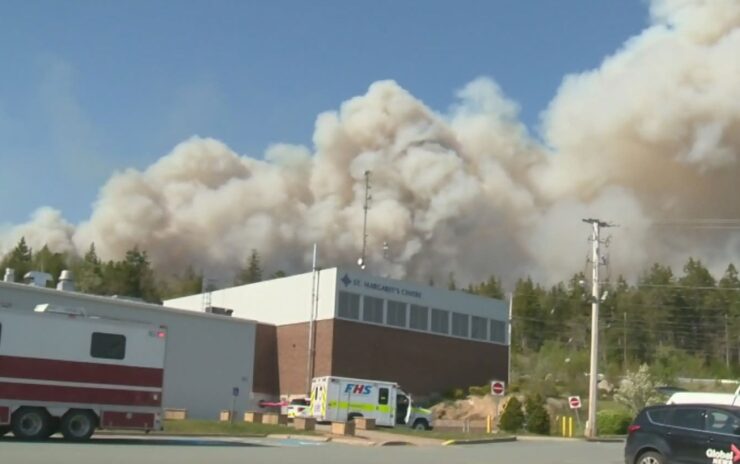Finding what is included in your home insurance can seem like a very daunting task. Home insurance is as unique as you are.
Maybe your house was flooded. Maybe your guest was injured in your home. Maybe a squirrel made your attic its new home. Whatever it may be, no one is better prepared to handle your unique situations and answer your questions than MacLeod Lorway. Our highly educated insurance professionals are here to make sure you have the right home coverage for your needs.
Home insurance is as unique as each homeowner or tenant. Speak with one of our highly educated insurance professionals to make sure you have the right coverage for your needs. Why roll the dice with online insurance, when MacLeod Lorway can help you succeed.
What can YOU do to prepare when Flooding is in the forecast?
It’s not a Noah’s Arc situation, but when the weather calls for flooding in Nova Scotia, we listen. No one wants to be stuck with inches of water in their basements if they can help it. The good news is you can do a lot to prepare and prevent the worst from happening. If weather advisories and flooding warnings have been circulating in the news or in your social media channels, pay attention and be prepared.
Gather supplies
Use these warnings as an opportunity to check on your home’s possible problem areas as well as to get any essentials you may need: sandbags, buckets, old towels, rain boots etc. You should also create a kit of items that you may not think about if an emergency arises: ID, cash, insurance policy, emergency numbers, important documents, change of clothes, toiletries and medications.
Clear your gutters
Be proactive by removing any leaves or debris from your eavestroughs and gutters. If they’re clogged and you don’t take action, it could cause damage to your roof or your foundation leading to costly repairs.
Check the basement
Ideally, you already have systems in place to keep water away from your home’s foundation and have sealed any cracks or openings in the basement. Before the rain starts, do a check of your systems to ensure everything is still in order.
Flooding can be costly if you’re not prepared. Although it’s best to prepare well before a storm warning, you can still put some measures in place to lessen the risk, including having the proper insurance coverage for flooding and water damage.
Make sure that you have the insurance coverage right for you and your home. Get in touch with the MacLeod Lorway branch nearest you to learn more about your home insurance options.
Whether you rent or own, your home is your castle. It’s where you should feel safe and secure. But there are always “what if’s” – floods, injuries and pests can turn your home-sweet-home sour. While you can never totally safeguard against the unexpected, there are a few simple things you can do to better protect you and your home.
To avoid flooding, clean your gutters regularly by removing leaves or debris, especially in autumn when the foliage falls. Check your basement for cracks and be sure to have systems in place to keep water away from the foundation in the case of a flash flood.
Injuries can happen even if you take the greatest care, but a little maintenance can go a long way in preventing avoidable trips and falls. Keep your steps and pathways clear, both inside and outside your house. Salt your front steps in the winter so visitors won’t take a tumble on ice.
And while ideally you and your family will be your house’s only residents, critters from outside are always looking to cozy up somewhere warm. Keep squirrels, raccoons and other animals out of your home by patching cracks and holes in your home’s exterior. Pay careful attention to your roof and attic.
For everything else that you can’t prepare for, there’s home owner’s and renter’s insurance. A MacLeod Lorway broker is always prepared to handle your unique situation and answer your questions. Contact one of our brokers today.
The holidays might the most wonderful time of the year, but they can also be the most stressful. Believe it or not, Atlantic Canadians on average spend more on the holidays than Canadians from other provinces – over $820 on gifts alone! With so much going on during the holidays, you don’t want any extra stresses. Prevent holiday-induced heart palpitations by safeguarding yourself from the two biggest threats during the winter months: house fires and theft.
Protect your home from fires:
Twinkly lights are beautiful but can be dangerous if wires are frayed. Before hanging, check the cords thoroughly to make sure there’s no damage. Once you’ve hung them, it may be tempting to show off your hard work by leaving your lights on all night long, but it’s safest to turn them off before you go to bed.
If you’re hanging lights around a tree indoors, don’t let the tree get dry – you’d just be giving a potential fire extra kindling. Keep your tree in a stand with a reservoir and water it regularly (this will also keep your tree looking fresher longer). Since you may be lighting your fireplace more often or using candles in your holiday decorating, it’s essential to check your smoke and carbon monoxide detectors.
Prevent theft:
Nicely wrapped gifts around the tree are a beautiful sight – and unfortunately thieves agree. Keeping all of your gifts around the tree makes it very easy for thieves to grab everything in one fell swoop. If you plan on keeping your gifts under the tree, valuable, easy-to-grab-and-go gifts (think smartphones, jewelry, etc.) should be kept hidden until they’re ready to be given to their intended recipient. At the very least, keep your tree and gifts away from a window so thieves won’t see an easy opportunity.
Don’t post about out-of-town holiday plans on social media as it lets people know your home will be empty. If you are going away, give a key to a neighbour you trust so they can periodically check in.
No matter how you spend the holidays, we hope you’re safe and secure. To prevent stress and protect your home year-round, talk to a Macleod Lorway broker today for insurance to suit your unique needs.
Winter isn’t just rough on people – our houses take a beating too. Since we can’t change the weather (try as we might), here are some things you can do to keep your home in good shape during winter’s inevitable snowstorms:
Start at the top
Your roof should be built to handle the weight of snow, but winter conditions can lead to new snow being packed onto old snow. Old snow has had time to compress so it’s heavier than fresh powder, and ice is much heavier than snow; only a couple inches can put your roof under serious strain. If you know a blizzard is coming, unburden your roof of any old snow or ice before it starts piling up. If you’re worried about your roof, use a snow rake to remove the built-up snow. Your roof may be slippery so never climb on top of it. Safety first.
Protect your pipes
When the temperature inside your home drops, there’s a chance your pipes could freeze and burst, leading to leaks and floods. Keeping your home warm during snowstorms is your best defence. Minimize drafts by filling cracks around window- and doorframes; cover your windows in plastic; use a woodstove or other heat source during power outages; and always keep your thermostat set to a warm, comfortable temperature. And this should go without saying, but never leave your windows open during the winter – it doesn’t take long for pipes to freeze.
Stock up
Here are a few things you should have to make sure you and your home are well prepared for winter storms:
• Firewood (or fuel for other non-electric heat sources): If your power goes out, the temperature in your house can plummet quick and blow your pipes. If you have a woodstove, fireplace, generator or other source of non-electric heat, ensure you have ample fuel. Don’t forget how long power was out during White Juan – have a week’s worth of fuel on hand at least.
• De-icers: Salt and sand can make your life easier if you sprinkle them on your steps and driveway before the snow starts to fall.
• Tools for snow removal: Whether you need just a shovel or a snowblower as well will depend on the size of your property as well as your abilities (and ambition).
• Home insurance: No matter what you do, some things will always be out of your control. If the unexpected happens, home insurance can protect you and your home. Not sure what type of home insurance you need? Talk to a MacLeod Lorway broker today!
We’ve had our fair share of winter weather lately here in the Maritimes, which has forced a lot of us to spend a little extra time indoors. What better time than this to stay busy by working on some small home maintenance projects? Take an afternoon to putter around the house to make these easy changes that can make a world of difference. From the bathroom to the kitchen to insurance and beyond, here are ways you can take care of your home:
In the bathroom:
New caulking is a cheap and effective way to not only make your bathroom look better but also protect your home from water damage and mold.
Next, the kitchen:
If you have a gas stove or a coil electric stovetop, clean out any grease or bits of food that have fallen underneath. Cleaning the inside of your oven is also important because an unclean oven can be a fire hazard.
To the laundry room:
This isn’t usually the most gorgeous room in any house, but it does serve a very practical purpose. Consider space-saving ideas: how can you incorporate shelving or storage boxes to make the space do double duty? Simple, affordable storage ideas are available at most hardware and big box stores. While you’re at it, clean out your dryer vents to protect your home from fires. To do this, turn on your dryer on a particularly chilly day and go outside; you should be able to clearly see the fog in the hot air. If it seems clogged, clear it out.
And don’t forget insurance:
Home insurance is the best way to take care of your home. Despite your best efforts to keep your home safe, the unexpected can happen. If something goes wrong, you’ll rest easier knowing that you’re covered. Not sure what kind of home insurance you need? Speak to a MacLeod Lorway broker today!
We make insurance personalized
We consider your wants and needs to make sure you get the coverage that makes sense for you.
Coverage. Care. Commitment.
"The best part of my day is making my clients happy."

Patricia Calder
Senior Account Executive,Sydney

